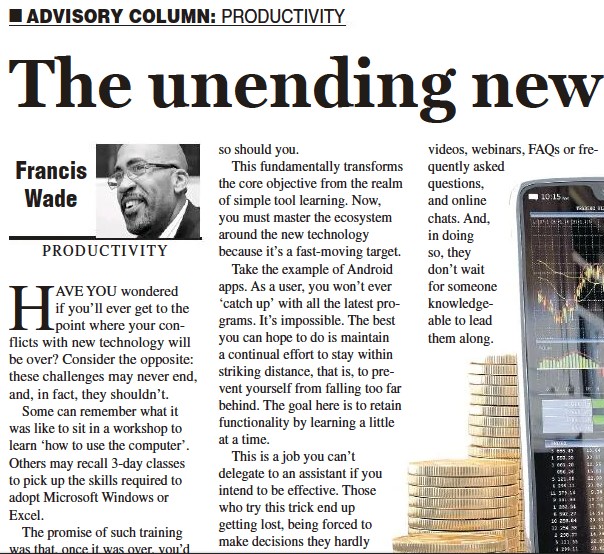What can you do in short periods which demand that you get a lot done, sometimes with overlapping deadlines? They are especially bothersome if your calendar is full and you feel as if you are already giving 100%. In those moments, you can’t defy time: you must ramp up your productivity.
As a Jamaican manager, January and September are probably a couple of your busiest months. Why? Both represent traditional returns from days spent away from the office. Projects which have been paused need to be resumed with gusto, energized by your downtime.
Some professionals fear or hate these two busy seasons, and others. They are forced to increase their productivity by several notches, but face a problem. They lack the methods. Believing their plates are full, they are actually mistaken. Here are some solutions the most effective people apply during their crunch times.
1) Tracking Personal Progress
What indicators of success do you use from one week to the next? While your company and department may have no problem measuring financial and operational metrics, there are few professionals who employ a personal scorecard.
If you’re like most, you probably have a vague sense of your performance, but it probably will not be enough. Certainly, those who perform at the highest level of any sport don’t rely on fuzzy feelings. But few professionals know how to create a scorecard showing their measurable accomplishments. And if they track one or two goals like sales or expenses, they almost never have a “balanced” scorecard covering the critical parts of their lives.
Consequently, even if they set ambitious goals such as a promotion or placement on a key project, they get lost. Instead of making progress, the daily grind buries them. A short-term focus driven by emergencies dominates.
Over time, their inattention leads to personal problems: unwanted pounds get added, technology skills wane and close friends drift away. Then, life intervenes with a dramatic, unexpected wake-up call. For example, the big plan for a relaxed retirement turns into a series of medical crises initiated by a heart attack. You failed to maintain your health at a younger age.
The remedy is simple: treat your entire life as if it were a precious resource whose well-being must be actively fostered. Pull out a spreadsheet and begin tracking. The cost? $0.
2) Creating a daily start-up routine
Most professionals who start personal tracking eventually stumble across another powerful technique: the morning ritual. Each single practice, which is a component of the ritual, may be ordinary, but the power lies in completing them as a group, over and over again.
Follow this habit and you’ll find it easy to scale to weekly, monthly and annual rituals. They all serve a similar purpose: at the beginning of a time period, you simply follow your own instructions.
But this is more than a convenience. Research shows that your mind requires a great deal of cognitive energy to innovate a brand new activity. However, when there is an existing script or checklist to follow, you can execute without pausing to re-think. So a periodic ritual saves precious time and effort.
You’ll also find that adding data to a scorecard is easy when it’s part of your daily ritual. The two practices are perfect complements.
3) Recognize Your Own Progress
New recruits from school to most companies often have a difficult time making the transition. The reason? Their former learning environments are highly gamified, but the new one isn’t. What do they find instead? Poor feedback, vague performance reviews, unclear goals and internal politics, which trump objective standards. Disillusionment sets in, blamed on the opaque, unfair nature of corporate life.
If you want to become more effective, you must learn to be content with self-recognition. This may take some maturity to achieve, but it’s the key to accomplishing important goals, even when others may not understand or approve.
This doesn’t mean you should be a hermit: it’s just that outside feedback is just one input, not a final judgment. Retain that ultimate power: as the decision-maker, you can ride far above circumstances and opinions.
Now, you’ll be playing an entirely different game of your own creation. You won’t be relying on the ones other people try to enforce using society’s popular yardsticks. With your scorecard and rituals, you’ll determine success, especially in those moments when your workload spikes upwards.
This should leave you confident. You’ll never be stuck wondering how to respond to a situation that demands more from you than ever before. For you, it will be a matter of adjusting your tracking and rituals before proceeding.

